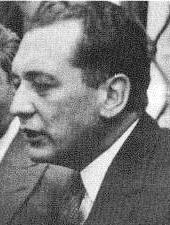Laureano Gómez Castro
| Laureano Gómez | |
|---|---|
 |
|
| 18th President of Colombia | |
|
In office 7 August 1950 – 5 November 1951 |
|
| Preceded by | Mariano Ospina Pérez |
| Succeeded by | Gustavo Rojas Pinilla |
| Minister of Foreign Affairs of Colombia | |
|
In office 21 March 1948 – 10 April 1948 |
|
| President | Mariano Ospina Pérez |
| Preceded by | Domingo Esguerra Plata |
| Succeeded by | Eduardo Zulueta Ángel |
| 28th Minister of Public Works of Colombia | |
|
In office 8 June 1925 – 7 August 1926 |
|
| President | Pedro Nel Ospina Vázquez |
| Preceded by | Aquilino Villegas Hoyos |
| Succeeded by | Mariano Ospina Pérez |
| Personal details | |
| Born |
Laureano Eleuterio Gómez Castro 20 February 1889 Bogotá, D.C., Colombia |
| Died | 13 July 1965 (aged 76) Bogotá, D.C., Colombia |
| Resting place | Central Cemetery of Bogotá |
| Nationality | Colombian |
| Political party | Conservative |
| Spouse(s) | María Hurtado Cajiao (1916–1965) |
| Children |
|
| Alma mater | National University of Colombia (BSc, 1909) |
| Profession | Civil engineer |
| Religion | Roman Catholic |
Laureano Eleuterio Gómez Castro (20 February 1889 – 13 July 1965) was the 18th President of Colombia from 1950 to 1953. In November 1951 poor health led him to cede presidential power to Roberto Urdaneta Arbelaez. On 13 June 1953, when he tried to resume his presidency, he was overthrown in a military coup led by Gustavo Rojas Pinilla. During the three decades prior to being elected president, Gómez was a radical leader of the Conservative Party, widely considered to be one of the most potent orators of the Congress of Colombia.
Gómez was born in Bogotá on 20 February 1889. He studied engineering at the National University of Colombia, graduating in 1909. He was the founder and editor of the periodical La Unidad from 1909 to 1916. He was first elected to parliament in 1911, serving until 1918. He was elected again in 1921 serving in various cabinet roles throughout the next twenty years. In 1932 Gómez gained control of the Conservative party in Colombia, a role which he relished. Under his leadership the party was highly disciplined, and provided strong opposition to the ruling Liberal Government. He was widely viewed as a brilliant parliamentarian and political tactician. However, he got into trouble because of his open sympathy for fascism; he was an admirer of Francisco Franco.
On 1 February 1936 Gómez founded El Siglo with Jose de la Vega, an old school friend, fellow Conservative, and senator. El Siglo was an intensely partisan newspaper, dedicated to promoting Conservatism and Catholicism. The editors indicated that stemming the tide of secularization in Colombia was one of their primary objectives. During the Liberal Republic, El Siglo became a significant platform for criticizing the Liberal Party. Gómez elevated any Liberal misstep to the level of national scandal. And he vehemently attacked Liberal policies; every new policy announcement, no matter how moderate, was met with a chorus of denunciation and declared to be the beginning of the path that would lead to Colombia’s ruin. One political scientist described his opposition campaign as "so wildly vitriolic that at times it seemed to border on insanity." In response to these incessant and sometimes brutal attacks, Liberals nicknamed Gómez “El Monstruo” (“The Monster”). The building housing the offices of El Siglo was destroyed during the bogotazo in the aftermath of the assassination of Jorge Eliecer Gaitán in 1948. While other structures associated with Gómez, such as his house, a restaurant he built, and the Palacio de San Carlos, were burnt to the ground, El Siglo’s building was first set on fire, and then dynamited. In September 1953, while in exile in Spain, Gómez published letters in El Siglo denouncing the military regime then in power in Colombia. As this defied censorship policies which outlawed criticism of General Gustavo Rojas Pinilla or the military government, the newspaper was closed and prohibited from publishing.
...
Wikipedia
